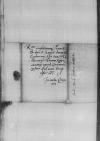Etsi superinscribed⌈EtsiEtsi superinscribed⌉ in summa, qua fungitur amplissima pro suo serenissimo ⌊rege⌋ legationis provincia Dignatio Vestra, tempe ms. o(!)
⌈ee ms. o(!)
⌉rare mihi debebam, ne otiosis meis litteris occupationibus vestris molestiam coniungerem, tamen metienti mihi facilitatem vestram nihil comitti aut peccari putavi, praesertim si meae litterae gratitudinem quandam vestrorum in me collatorum beneficiorum et favoris testarentur, quando sicut nulla tam magna diis immortalibus de rebus omnibus tum sit cura et cogitatio, ut aut supplices mortales, aut gratos pro beneficiis non libenter audiant.
Quare imprimis grates sint immortales, quod Gratia Vestra tanta sua benevolentia affecerit me ⌊Augustae⌋ et illustrissimo ⌊Alberto duci⌋ non mediocriter commendavit in famulitium. Speravi enim non posse non succedere, quod tanto patrocinio commendatum esset, sane ut merita Reverendissimae Dignationis Vestrae superant sua magnitudine, ita facile scio parem me gratiam referre non posse. Manebit tm tum apud me semper tanti beneficii immortalis memoria capietque, si non alium, Gratia Vestra sui beneficii fructum. Hunc tum, quod in gratum contulerit, et beneficii memorem diis immortalibus pro benignitate hostimentum est animus gratus, quod ex claris hominibus, quos ampliora beneficia contulisse quam accepisse oblectat.
Ceterum, Reverendissime Domine, cum desit ad commendationem scire, quantum valuerit apud illustrissimum ⌊Prussiae ducem⌋ ea commendatio quemque fructum paper damaged⌈[tum]tum paper damaged⌉ pepererit, rogo, aut domino ⌊Cornelio Sceppero⌋ scribendum committatis, aut si horae aliquot sunt otiosae et succe ms. i(!)
⌈ee ms. i(!)
⌉sivae tantum temporis ad scribendum Dominationi Vestrae superinscribed in place of crossed-out ipsa⌈ipsaDominationi VestraeDominationi Vestrae superinscribed in place of crossed-out ipsa⌉ suffuretur aut detrahat ... illegible⌈...... illegible⌉.
Si illustrissim ms. n(!)
⌈mm ms. n(!)
⌉us ⌊dux⌋ facit condicionem ipse, ad Gratiam Vestram properabo omniaque consilio et voluntate vestra superinscribed⌈vestravestra superinscribed⌉ de profectione constituam. Sin nulla est aut non satis liberalis condicio, attamen perpetuo me obstringet tam facilis Gratiae Vestrae superinscribed⌈VestraeVestrae superinscribed⌉ animus paratusque, ut et iuvaret, et prodesset.
Commendo mea servitia.


 BCz, 1595, p. 204
BCz, 1595, p. 204